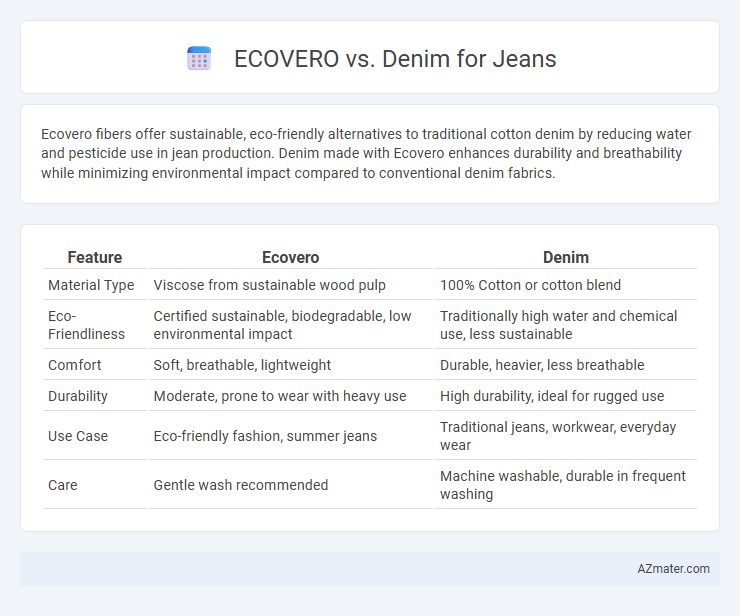Ecovero fibers offer sustainable, eco-friendly alternatives to traditional cotton denim by reducing water and pesticide use in jean production. Denim made with Ecovero enhances durability and breathability while minimizing environmental impact compared to conventional denim fabrics.
Table of Comparison
| Feature | Ecovero | Denim |
|---|---|---|
| Material Type | Viscose from sustainable wood pulp | 100% Cotton or cotton blend |
| Eco-Friendliness | Certified sustainable, biodegradable, low environmental impact | Traditionally high water and chemical use, less sustainable |
| Comfort | Soft, breathable, lightweight | Durable, heavier, less breathable |
| Durability | Moderate, prone to wear with heavy use | High durability, ideal for rugged use |
| Use Case | Eco-friendly fashion, summer jeans | Traditional jeans, workwear, everyday wear |
| Care | Gentle wash recommended | Machine washable, durable in frequent washing |
Introduction to Ecovero and Denim Fabrics
Ecovero is a sustainable viscose fiber derived from certified renewable wood sources, offering eco-friendly alternatives to traditional fabrics with lower environmental impact. Denim, a durable cotton twill fabric, is widely used in jeans for its strength and classic texture, but conventional cotton denim often involves high water and pesticide use. Combining Ecovero fibers with denim production enhances sustainability by reducing resource consumption while maintaining the fabric's signature comfort and durability.
Origins and Production Processes
Ecovero fibers originate from sustainable wood sources certified by the Forest Stewardship Council (FSC), using a closed-loop production process that recycles water and solvents to minimize environmental impact. Denim is traditionally made from cotton, often involving intensive water use, pesticide application, and energy-consuming dyeing methods, though sustainable variations now incorporate organic cotton and innovative eco-friendly treatments. Comparing origins and production, Ecovero emphasizes renewable raw materials and eco-conscious manufacturing, while denim's sustainability heavily depends on crop cultivation practices and advances in cleaner processing technologies.
Environmental Impact Comparison
Ecovero fibers for jeans significantly reduce environmental impact by utilizing certified sustainable wood sources and a closed-loop production process that cuts water and energy consumption by up to 50% compared to traditional materials. Denim made from conventional cotton typically involves high water usage, pesticide use, and greenhouse gas emissions, contributing to substantial ecological degradation. Choosing Ecovero-based jeans supports lower carbon footprints and promotes sustainable forestry, making them a more eco-friendly alternative in denim production.
Sustainability and Eco-friendliness
Ecovero, a sustainable viscose fiber derived from certified renewable wood sources, offers significant eco-friendly advantages over traditional denim made from conventional cotton, which requires extensive water and pesticide use. Ecovero's production process emits 50% less carbon and uses less water compared to standard viscose, making it a more sustainable choice for jeans manufacturing. Denim made from sustainably sourced cotton or blended with fibers like Ecovero enhances the garment's overall environmental profile by reducing resource consumption and chemical impact.
Comfort and Wearability Differences
Ecovero fibers, derived from sustainably sourced wood pulp, offer superior moisture-wicking and breathability compared to traditional denim, enhancing overall comfort in jeans. Denim, typically made from cotton, provides durability but may lack the softness and elasticity found in Ecovero blends, affecting wearability during prolonged use. Jeans incorporating Ecovero demonstrate improved flexibility and reduced stiffness, making them a preferred choice for comfort-focused consumers without compromising style.
Durability and Longevity
Ecovero fiber, derived from sustainable wood sources, offers moderate durability but generally falls short compared to traditional denim made from heavyweight cotton in terms of longevity. Denim's robust cotton weave provides superior resistance to wear and tear, making jeans last longer under frequent use and heavy friction. While Ecovero enhances eco-friendliness, denim remains the preferred choice for durable, long-lasting jean fabric.
Style and Aesthetic Versatility
Ecovero fibers offer a smooth, eco-friendly finish that enhances the natural drape and color retention of denim, making jeans both stylish and sustainable. Denim crafted with Ecovero blends adapts seamlessly to various washes and treatments, providing versatile options from classic indigo to contemporary distressed looks. This combination elevates the aesthetic appeal while maintaining comfort and durability, ideal for fashion-forward consumers seeking both style and environmental responsibility.
Cost and Market Availability
Ecovero fibers offer a sustainable alternative for denim production but generally come at a higher cost compared to traditional denim fabric, impacting overall jean pricing. Market availability of Ecovero denim is expanding as eco-conscious brands increasingly incorporate these fibers, though it remains limited compared to widely accessible conventional denim. This cost and availability gap affects consumer adoption and retailer stocking decisions within the competitive denim apparel market.
Consumer Preferences and Trends
Consumers increasingly prefer Ecovero fibers for jeans due to their sustainable production process, which uses 50% less water and generates 50% fewer emissions compared to conventional viscose. Denim made with Ecovero attracts environmentally conscious buyers seeking eco-friendly fashion without compromising comfort or durability. Market trends highlight rising demand for sustainably sourced materials, positioning Ecovero as a favored alternative to traditional denim fabrics.
Final Verdict: Which is Better for Jeans?
Ecovero fibers, derived from sustainable wood pulp, offer enhanced breathability and environmental benefits compared to traditional denim, which is primarily cotton-based and often requires intensive water usage. Denim provides durability and a classic texture essential for jeans, but Ecovero-infused blends improve moisture management and comfort, contributing to eco-friendly fashion solutions. For jeans, choosing Ecovero materials results in better sustainability without compromising on softness, making it a superior option for eco-conscious consumers.

Infographic: Ecovero vs Denim for Jean
 azmater.com
azmater.com